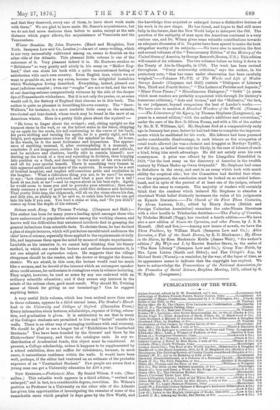NEW Enrrrons.—Prehistoric Man. By Daniel Wilson. 2 vols. (Mac- millan.)
This valuable work appears in a third edition, "revised and enlarged," and in fact, to a considerable degree, rewritten. Dr. Wilson's position as Professor in a University on the other side of the Atlantic has given him opportunities of investigating the remains of some of the remarkable races which peopled in days gone by the New World, and
the knowledge thus acquired or enlarged forms a distinctive feature of his work in its new shape. He has found, and hopes to find still more fully in the future, that the New World helps to interpret the Old. The question of the antiquity of man upon the American continent is a very curious one, and Dr. Wilson gives some valuable contributions towards an adequate discussion of it. No pains have been spared to make the book altogether worthy of its subjects.—We have also to mention the first and second volumes of the "Tercentenary Edition " of the History of the United States of America, by George Bancroft (Boston, U.S.). This edition will consist of six volumes. The two volumes before us bring it down to the Treaty of Aix-la-Chapelle, in 1748. The work has been revised throughout. "Every noteworthy criticism," says the author, in his prefactory note, "that has come under observation has been carefully weighed."—Volumes IV.-VII. of The Works and Life of Walter Savage Lander (Chapman and Hall) contain "Dialogues of Literary Men, Third and Fourth Series ;" "The Letters of Pericles and Aspasia r "Minor Prose Pieces ;" "Miscellaneous Dialogues ;" Gebir " (a poem which most readers are probably acquainted with through De Quincey's humorous criticism), "Acts and Scenes," and the " Hellenics," the last, in our judgment, beyond comparison the best of Landor's works.— We have also to mention A Hundred Wonders of the World. (Nimmo.)
The Literature of the Kynny, by Thomas Stephens (Longmans), ap- pears in a second edition," with the author's additions and corrections," under the care of the Rev. D. Silvan Evans, and with a life of the author by Mr. B. T. Williams, Q.C. Mr. Stephens died at a comparatively early age in January last year, before he had had time to complete the improve- ments which he meditated for his work. His labours had been pursued under considerable disadvantage, in such leisure as the occupation of retail trade allowed (he was a chemist and druggist at Merthyr Tydfil), nor did they, as indeed was only too likely, in the case of labours of such a kind, bring him much advantage. He did not satisfy even his own countrymen. A prize was offered by the Llangollen Eisteddfod in 1858, "for the best essay on the discovery of America in the twelfth century by Prince Madoc ap Owen Gwynedd." Mr. Stephens had come to disbelieve in the story, and sent in an essay which took with much ability tho sceptical side ; but the Committee had decided that what- ever the argument, the conclusion must be looked on as settled before- hand, and in spite of the protest of at least one of the judges, refused to allow the essay to compete. The majority of readers will certainly think that the candour which induced Mr. Stephens to abandon a cherished Welsh belief distinctly increases the value of his judgments on "Cymric literature.—The Church of the First Three Centuries-, by Alvan Lawson, D.D., edited by Henry Jerson (British and Foreign Unitarian Association) examines the ante-Nicene literature with a view hostile to Trinitarian doctrine.—The Poetry of Creation, by Nicholas Michell (Tegg), has reached a fourth edition.—We have also a new edition of Simon the Cyrenian, and other Poems, by J. S. B. Monsell. (Bell and Son.)—Among new issues of novels, we have the Three Feathers, by William Black (Sampson Low and Co.) ; Alice Lorraine, a Tale of the South Downs, by R. D. Blackmore ; My Home in the Shires, by Rosa Mackenzie Kettle (James Weir), "the author's edition ;" My Wife and I, by Harriet Beecher Stowe, in the series of "The Rose Library" (Sampson Low and Co.); Grasp Your Nettle, by Mrs. Lynn Linton (Smith and Elder); and Tom Cringle's Loy, by Michael Scott (Warne),—a reminder, by the way, of the lapse of time, as its appearance seems to indicate that the copyright has expired. We have to acknowledge the Transactions of the National Association for the Promotion of Social Science, Brighton Meeting, 1875, edited by C. W. Ryalls. (Longmans.)






























 Previous page
Previous page